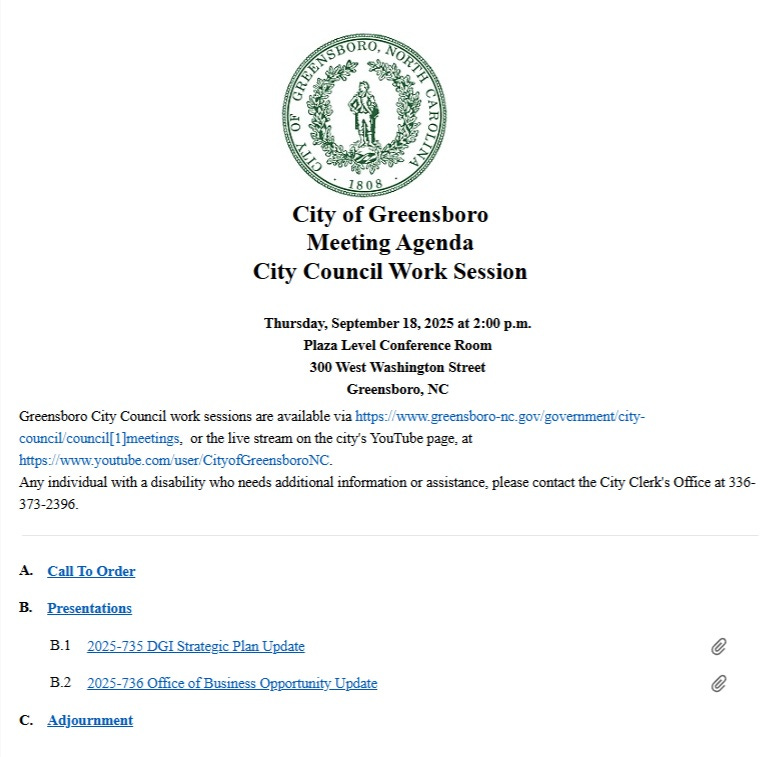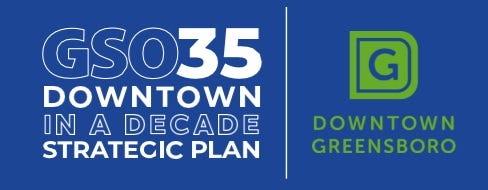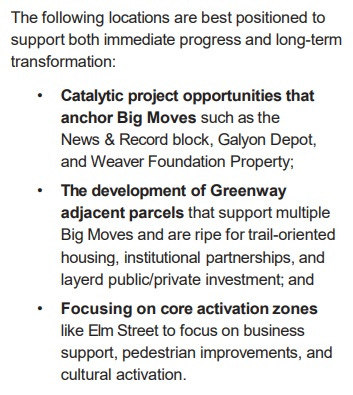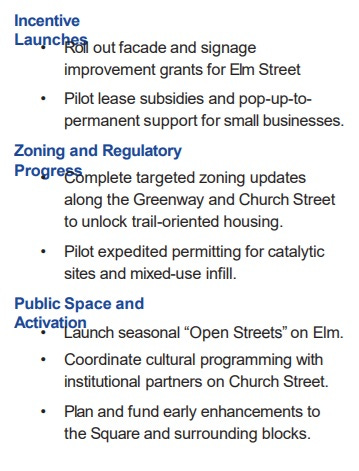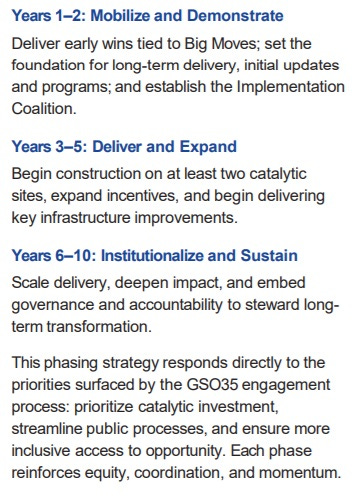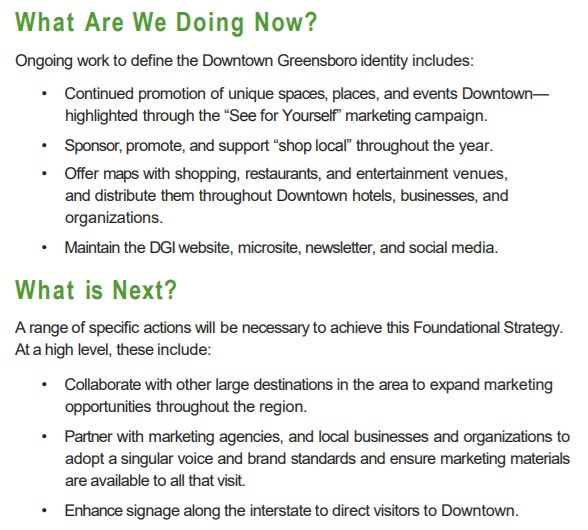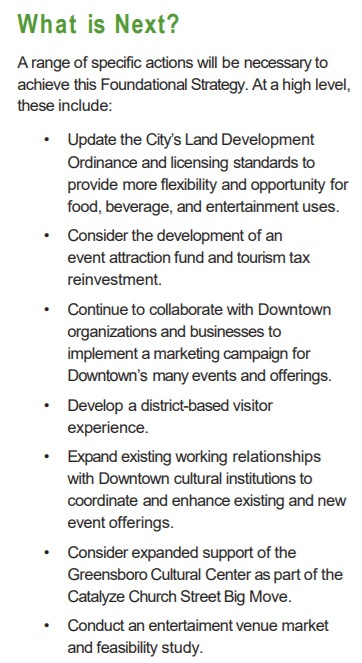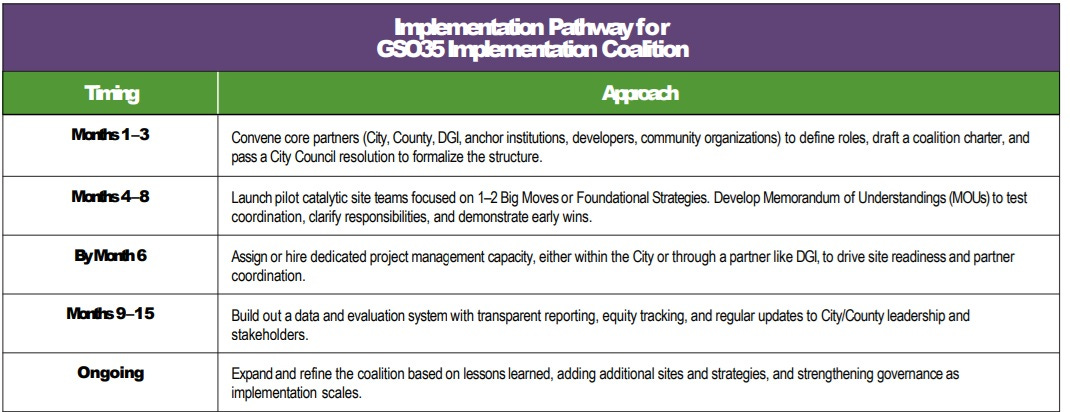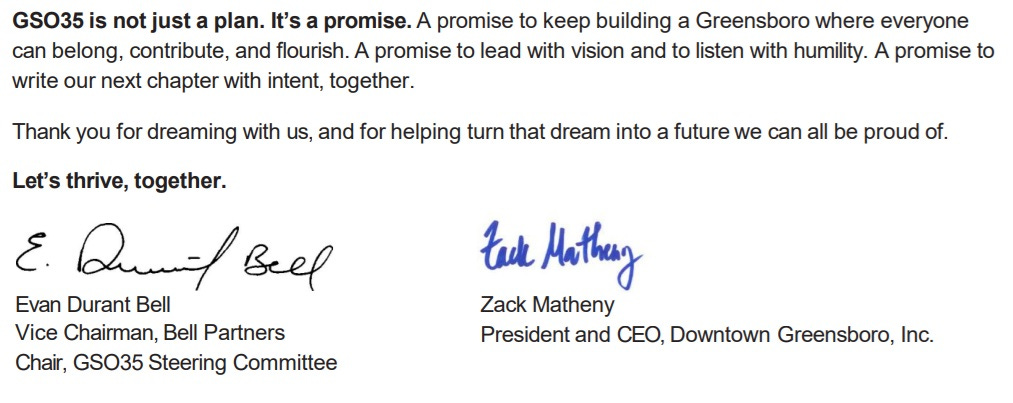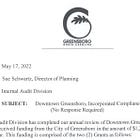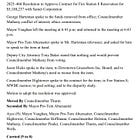How Zack Matheny’s "Thrive" GSO35 Presentation and Deliberations Violated North Carolina Law
Sharon Hightower; "The question is how much?" ............ Zack; "How much you got?"
On 9/18/2025, Greensboro City Councilmember Zack Matheny, while simultaneously serving as the taxpayer funded Chief Executive Officer of Downtown Greensboro, Inc. (DGI), appeared before a Greensboro City Council work session and directly requested public funding for himself and his ‘associates’ via taxpayers financing DGI initiatives and developer ‘economic’ incentives.
Matheny’s DGI presentation, broadcast with taxpayer resources with the help of City employees, which substantially overlaps with DGI’s website and Zack’s campaign platform, appears to have defied election ethics regulation and conflict of interest legislation.
Link to the meeting video;
Zack begins at 53:10
Sharon Hightower says "The question is how much?" and Zack replies "How much you got?" at 1:19:10
.
§ 14‑234.3. Local public officials participating in contracts benefiting nonprofits with which associated.
(a) No public official shall knowingly participate in making or administering a contract, including the award of money in the form of a grant, loan, or other appropriation, with any nonprofit with which that public official is associated.
DGI’s website;
https://www.downtowngreensboro.org/
The last page of the presentation and link to the entirety;
https://pub-greensboro-nc.escribemeetings.com/filestream.ashx?DocumentId=59307
Use of Public Resources for Election Advantage (Dollar v. Town of Cary + G.S. 160A-499.3):
Matheny’s request for money occurred in the Plaza Level Conference Room, using taxpayer-funded time, facilities, and broadcasting platforms. Because his DGI GSO35 pitch closely tracks and reinforces the themes of his campaign platform, it triggers the primary purpose test from Dollar v. Town of Cary, where public funds used to advance policy messaging that aligned with certain candidates during election season were struck down as unlawful. Under § 160A-499.3, this conduct amounts to using public resources in a way that effectively endorses himself as a candidate, giving him an impermissible election advantage.
Same thing only different; Link to Matheny’s campaign site;
https://mathenyforcouncil.com/
.
Direct Requests for Public Funds & Financial Tools from the DGI Presentation;
“Key redevelopment sites, including the News & Record, Gate City,
and multiple South End parcels
...all will require coordinated investment, entitlements,
and infrastructure assistance to move forward."
Translation: Private developers aligned with DGI expect city taxpayers to help pay for the foundational infrastructure (streets, utilities, etc.) to increase private profitability.
"This level of commitment reflects confidence in Downtown Greensboro,
catalyzes public-private partnerships,
and helps fund infrastructure, housing, and cultural anchors."
Translation: The "commitment" referenced is public taxpayer funded investment, which will be used to pay for these specific things.
"A transformational development...
will require strategic partnerships to structure incentives...
and consider Tax Increment Financing Opportunities."
Translation: This is a direct ask for the city to create a TIF district, which is a powerful public financing tool that diverts future property tax revenue from a defined area to pay for current improvements in that same area at the expense of everyone else.
"Public realm upgrades like those envisioned along Elm Street
have been shown in peer cities to generate $4–6 in private investment
for every $1 in public funding, making this a big impact."
Translation: This is a justification for spending public money by promising a high return on investment. The ask for the public funding is implied.
"A return on investment of up to $16 in value
for every $1 spent on trail construction"
Translation: Same as above. This is another justification for more requests for the city to allocate more funds for the over-budget greenway/trail construction based on very questionable consultant paid for ‘impact’ studies. Related;
"Offering Catalyst and Facade grants to assist in Downtown investment."
& "Enhance existing facade grant programs."
Translation: This is a direct request for the city to increase DGI funding for grant programs that give money to downtown property owners to improve their buildings.
"Partnering with the City to launch a free Downtown trolley service
and introduce Bird scooters with parking zones."
Translation: The city would be the entity funding the "free" trolley service and likely subsidizing or DGI managing the scooter program infrastructure.
"Providing grants to support new businesses and pursuing external funding..."
Translation: DGI wants more public money from the city to then re-grant it to downtown businesses and itself, which would not be available to Matheny’s constituents in District 3 or the rest of the city’s population.
"Consider the development of an event attraction fund and tourism tax reinvestment."
Translation: This is a DGI request to create a new pool of money (the fund) and to redirect/increase existing tourism tax revenue specifically to downtown projects.
"Consider expanded support of the Greensboro Cultural Center..."
Translation: A direct ask for increased public funding for this downtown facility.
"shifting from grants to lending" implies a public fund for loans specifically to downtown businesses.
"sharing costs of structured parking"; GSO35 says the city should help pay for building parking decks for DGI’s clients and board members as has already occurred for Roy Carroll and Randall Kaplan/Kathy Manning.
"supporting the Office of Business Opportunity through targeted support" requests more funding within a city office specifically for downtown projects.
Requests for Public Staff, Resources, and Policy Changes which shows how DGI and Zack Matheny lobbies the city at the expense of the rest of Matheny’s District 3 constituents;
These items require the commitment of city staff time, legal resources and changes to city policy, all of which have significant budgetary implications.
"Continue to work with the City to update development standards... and to ensure lower parking requirements."
Translation: DGI is asking the city to dedicate its planning and legal staff to rewrite city ordinances for downtown.
"Partnering with the City’s Clean and Green Team [through DGI] to guide Downtown beautification efforts..."
Translation: Dedicate more staff and resources to downtown priorities.
"Coordinate with the City to address ordinances, timelines, and concerns." & "Partner with the City to create a more efficient... permit process, including exploring a 'business advocate’ position."
Translation: This asks the city to fundamentally change its operations and create a new paid city staff position ("business advocate").
"Update the City’s Land Development Ordinance..."
Translation: Another major request for the city to dedicate significant capital, staff and legal resources to rewriting laws and develop taxpayer funded projects.
"Pilot expedited permitting for catalytic sites..."
Translation: Dedicate specific city staff to prioritize these projects, hence pulling them from other priorities for DGI’s clients.
The Biggest Ask: Governance and Structure
"They require an Implementation Coalition..."; "Convene core partners... and pass a City Council resolution to formalize the structure."
Translation: DGI is asking City Council to create a new governing body which Zack would essentially control along with his clients.
"Assign or hire dedicated project management capacity,
either within the City or through a partner like DGI..."
Translation: This is one of the most significant asks. It explicitly requests that the city pay for a new project manager (either as a city employee or by funding a position at DGI) whose sole job is to drive these projects forward.
The entire "Implementation" section is a blueprint for how the city government should redirect its resources and policies to fund and facilitate downtown DGI projects.
.
As a City councilmember, Matheny's primary role is to represent his constituents and make decisions in the best interest of the entire city. In this capacity, he has a fiduciary duty to the city. As president of DGI, his role at DGI is to advocate for the specific interests of the downtown district. DGI is a non-profit organization that contracts with the city to provide services. This is known as "wearing two hats." The conflict arises because he is both an advocate asking for funds and an elected official responsible for deliberating the participating in the allocation of those same funds.
As DGI's contract with the city is a significant source of its operating budget, and Zack's salary is paid from that budget, then participating in deliberations to fund DGI has a direct financial impact on him.
.
§ 14‑234.3. Local public officials participating in contracts benefiting nonprofits with which associated.
(a) No public official shall knowingly participate in making or administering a contract, including the award of money in the form of a grant, loan, or other appropriation, with any nonprofit with which that public official is associated.
.
§ 14-234. Public officers or employees benefiting from public contracts
(a) (1) No public officer or employee who is involved in making or administering a contract on behalf of a public agency may derive a direct benefit from the contract.
Mr. Matheny, as DGI’s compensated CEO, participated in a presentation before Greensboro City Council requesting funding for DGI and his associates within the GSO35 proposals.
Sharon Hightower; "The question is how much?" ............ Zack; "How much you got?"
As a member of City Council, he is influencing appropriations to DGI, creating a direct financial conflict.
Matheny discussing these specific developments in the presentation moves beyond a potential future conflict and into the territory of likely violation.
As a paid CEO of DGI, Matheny has a direct financial interest in whether the City gives DGI money or terminates DGI’s contract. By speaking at a Council meeting to request funds, he participated in a matter where he stood to benefit financially. That’s a textbook statutory conflict of interest.
While the statute specifically says "shall not vote," the ethical and legal standard for a conflict of interest encompasses the entire process of "participation in making" a decision.
This includes:
Deliberation: Discussing the merits of the proposal.
Advocacy: Using one's position to persuade colleagues.
Shaping the Debate: Influencing the framework through which other council members view the issue.
By presenting and discussing these specific items, Matheny is not just preparing for a future vote; he is actively steering the council’s attention and framing the narrative around projects that he, due to his DGI role, has a pre-existing commitment to advance.
Even if he were to later recuse himself from the actual vote as the law requires, his early participation poisons the well. His colleagues have now been influenced by his advocacy. He has set the terms of the debate. The subsequent vote cannot be considered fully impartial because it was shaped by someone who had a legally recognized conflict of interest from the outset.
He is, in effect, acting as their de facto advocate from his seat on the council dais. This makes the conflict not just a future possibility, but a present and active reality.
Discussing these specific developments is arguably worse than just voting on them. It represents a front-loaded violation of the principles behind the recusal statute. He is doing the work of advocating for a conflicted interest before the item even officially comes up for a vote, making any later recusal a mere technicality that does nothing to cure the initial ethical breach.
.
This conduct strongly suggests a failure to understand or respect the fundamental boundary between his role as a city official and his role as a lobbyist for downtown developers, especially on the zoning and development aspects;
“§ 160D‑109. Conflicts of interest;
(a) Governing Board. – A governing board member shall not vote on any legislative decision regarding a development regulation adopted pursuant to this Chapter where the outcome of the matter being considered is reasonably likely to have a direct, substantial, and readily identifiable financial impact on the member. A governing board member shall not vote on any zoning amendment if the landowner of the property subject to a rezoning petition or the applicant for a text amendment is a person with whom the member has a close familial, business, or other associational relationship."
Rezoning petitions (e.g., rezoning the News & Record property)
"Update the City’s Land Development Ordinance"
Adoption of new development plans or policies (like the ones described in the presentation that require zoning changes)
.
Misuse of Public Office – N.C.G.S. § 138A-31
Mr. Matheny appears to have used his position as City Councilman to secure both financial benefit (through DGI funding) and political benefit (through alignment of official presentations with campaign messaging).
.
Political Activity Using Public Office – N.C.G.S. § 126-13; Chapter 163 (Election Laws)
Mr. Matheny’s DGI presentation to City Council on the “GSO35 Plan” closely mirrors his campaign platform and campaign website language.
By presenting campaign themes in his official capacity during City Council proceedings, he has blurred the line between governing and campaigning, using taxpayer resources and City platforms for electioneering.
.
N.C.G.S. § 163-278.14A
The law states: "No person shall offer or threaten to use, or use, any public authority, influence, position, or property to secure any political contribution, reward or favor for any person or for himself or herself."
Matheny used his position as a City Councilmember to give weight and authority to the presentation. His presence as an official leveraged his public position.
The plaza conference room is public property. The city council meeting was an official government function. Using this platform to advance an initiative that is a cornerstone of his campaign could be construed as using public property for campaign purposes.
"To secure any political... favor for... himself":
The "favor" in this case is not just money, but political benefit. The argument would be that the purpose of the presentation was to;
Generate positive publicity for his campaign.
Associate himself with a popular, visionary project.
Create a record of achievement to run on.
Put his council colleagues in a position where opposing it could be used against them in an election, thereby securing a "favor" of their support.
.
N.C.G.S. § 160A-168 (Use of public funds for political purposes): This statute generally prohibits the appropriation of public funds for any "political purpose." While often applied to direct contributions, it can be interpreted to cover the use of government resources (like staff time or official platforms) for political gain.
Councilmember Matheny, in his official capacity at an official meeting, used his public position and public property (the council chamber).
He used this platform to promote the GSO35 plan, which is a central pillar of his political campaign for office.
The primary purpose and effect of this timing were to secure a political favor for himself—namely, a significant campaign advantage, positive media coverage, and a record of achievement to present to voters.
.
§ 160A‑499.3. Limitation on the use of public funds. A municipality shall not use public funds to endorse or oppose a referendum, election or a particular candidate for elective office.
GSO35 EXECUTIVE AND STEERING COMMITTEE MEMBERS OF INTEREST
Durant Bell, Bell Partners (Committee Chair)*; Matheny's former employer and downtown investor; DGI financial sponsor
Zack Matheny, DGI*
Susan Schwartz, Cemala Foundation*; DGI financial sponsor
Walker Sanders, CFGG*; Recipient of taxpayer funded gifts via Matheny; DGI financial sponsor; Part owner of the News & Record property highlighted in DGI's presentation
Brent Christensen, GSO Chamber*; Recipient of taxpayer funded gifts via Matheny; DGI financial sponsor;
Cecilia Thompson, Action Greensboro; Recipient of DGI taxpayer funds
Trey Davis, City of Greensboro; DGI board member and recipient of taxpayer funded gifts via Matheny
Ginna Freyaldenhoven, LS3P; DGI board member
Andrea Harrell, City of Greensboro; Attended the presentation along with City Manager and DGI board member Trey Davis
Frankie Jones, Lincoln Financial; DGI financial sponsor, Greensboro Sports Foundation board member, whose Richard Beard can't come up with an overdue 990
Tim Minor, NC A&T; DGI board member
Arthur Samet, Samet Corporation; DGI board member, City of Greensboro contractor and Matheny campaign contributor
Kim Gatling, Fox Rothschild LLP / A&T; City of Greensboro contractor; DGI financial sponsor
Claudel Pressa, The Carroll Companies; Roy Carroll employee; another Carroll employee, Craig Carlock, serves on DGI's board; Roy is a Matheny campaign contributor and Recipient of taxpayer funded gifts via Matheny;
George Hoyle, UNCG; Greensboro Sports Foundation Board; Appearance of DGI related expenditure issues with Richard Beard
Joe Rieke, The Miriam P.Brenner Children’s Museum; Named as a project in the GSO35 presentation
Marvin Price, GSO Chamber
GSO35 FUNDING PARTNERS
Joseph M. Bryan Foundation; DGI financial sponsor
The Cemala Foundation; DGI financial sponsor
City of Greensboro; GSO35 is a taxpayer funded project
Community Foundation of Greater Greensboro
Greensboro Chamber of Commerce; DGI financial sponsor
Greensboro Development Partnership; Chair, Chester Brown III; Matheny contributor
Greensboro Development Partnership; Sharon Hightower, Director
Others of Interest;
John Lomax, former DGI board member; Matheny contributor; Ownership interest in a GSO35 targeted project; DGI financial sponsor
Andy Zimmerman, DGI Past Chair; Matheny contributor; Ownership interest in a GSO35 targeted project; Recipient of taxpayer funded gifts via Matheny;
Related;
Disclaimer: The information presented in this article is provided for public awareness and commentary purposes only. It is based on publicly available records, reporting, and applicable North Carolina statutes and case law. Nothing contained herein should be construed as legal advice or as a definitive statement of law. Readers are encouraged to review the cited statutes and cases independently and to consult with qualified legal counsel regarding any specific legal questions. All individuals mentioned are presumed innocent of any violation unless and until proven otherwise in a court of law.


